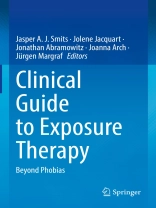Clinical Guide to Exposure Therapy provides evidence-based guidance on how to incorporate and tailor exposure therapy for patients who present with problems beyond fear and its disorders. Exposure therapy is a relatively easy-to-implement intervention with powerful effects. Helping clinicians expand their reach and effectiveness, this clinician’s guide includes chapters on (1) considerations for deviating from standard exposure protocols when patients present with comorbid psychiatric or medical conditions and (2) how to use exposure therapy in the treatment of conditions that do not center on fear or anxiety (e.g., eating disorders, obesity, depression, substance use disorders, chronic pain). Complementing existing resources for clinicians on exposure therapy for the treatment of anxiety disorders, this volume provides guidance on issues related to the planning and implementation of exposure interventions more broadly. This clinical guide an essential resource forthe advanced trainee and clinician providing exposure therapy for complex comorbidities and unique populations.
สารบัญ
Section 1: Introduction.- Chapter 1: The Basics of Exposure Therapy.- Chapter 2: Exposure Therapy across Presenting Problems.- Section 2: Exposure Therapy with Challenging Comorbidities.- Chapter 3: Exposure Therapy with Comorbid Anxiety Disorders and Medical Conditions.- Chapter 4: Exposure Therapy with Comorbid Anxiety Disorders and Autism Spectrum Disorder.- Chapter 5: Exposure Therapy with Comorbid Anxiety Disorders and Psychosis.- Chapter 6: Exposure Therapy with Comorbid Anxiety Disorders and Substance Use Disorders.- Chapter 7: Exposure Therapy with Comorbid Anxiety Disorders and Depression.- Chapter 8: Exposure Therapy with Comorbid Anxiety Disorders and Borderline Personality Disorder.- Section 2: Exposure Therapy with Special Populations.- Chapter 9: Exposure Therapy in the Treatment of Substance Use Disorders.- Chapter 10: Exposure Therapy in the Treatment of Eating Disorders.- Chapter 11: Incorporating Exposure Therapy in the Treatment of Depression.- Chapter 12: Incorporating Exposure Therapy in the Treatment of Chronic Pain.
เกี่ยวกับผู้แต่ง
About the Editors:
Jasper Smits, Ph.D. is Professor of Psychology at the University of Texas at Austin, where he directs a research lab and clinic that focus on the treatment of anxiety and related disorders. Among his core interests are developing strategies that enhance exposure therapy outcomes and the training of clinicians in the delivery of this empirically-supported intervention. Dr. Smits is a federally-funded investigator who has published over 200 articles, chapters, and books spanning his interests. He also is a member of the Scientific Council of the Anxiety and Depression Association of America, consults to industry, and provides regular workshops on the treatment of anxiety and related disorders at national and international meetings.Jolene Jacquart, Ph.D. is a licensed clinical psychologist and an assistant clinical professor at the University of Arizona where she directs the Psychology Department’s training clinic, the Behavioral Health Clinic. She receivedher doctorate in clinical psychology from the University of Texas at Austin and completed a clinical internship at Vanderbilt University Medical Center. Her research and clinical interests include the dissemination and implementation of evidence-based treatments for anxiety and depression-based disorders, developing strategies that enhance treatment outcomes, and in understanding and improving the training of clinicians in the evidence-based treatments.
Jonathan (Jon) Abramowitz, Ph.D., is Professor and Director of Clinical Training in the Department of Psychology and Neuroscience at the University of North Carolina at Chapel Hill, USA. His research and clinical work focuses on the treatment and study of anxiety and obsessive-compulsive disorder (OCD). He has authored over 300 scientific publications and 20 books, which have been translated into several languages. He served as President of the Association for Behavioral and Cognitive Therapies and as Editor or Associate Editor of several academic journals. Dr. Abramowitz has received wide recognition for his scholarly work and contributions.
Joanna Arch, Ph.D. is Professor of Psychology and Neuroscience at the University of Colorado Boulder, Member in Cancer Prevention and Control at the University of Colorado Cancer Center, and a licensed clinical psychologist. Her research focuses on developing and evaluating interventions designed toaddress anxiety disorders and to improve well-being among adults with cancer, with a focus on acceptance-based interventions. She has received funding in both mental health and cancer care populations from the National Institutes of Health, American Cancer Society, and the Templeton Foundation.
Jürgen Margraf, Ph.D. is the Alexander von Humboldt Professor of Clinical Psychology and Psychotherapy at Ruhr-University Bochum, where he is Director of the Mental Health Research and Treatment Center. In his work on mental health, he is particularly interested in the link between etiological and therapeutic research and the interplay of psychological, biological and social factors. His work has led to over 500 publications as well as leading textbooks, clinical dictionaries and therapy manuals. Prof. Margraf was founding chairman of the Scientific Advisory Board for Psychotherapy of the Federal Republic of Germany, director of the Swiss National Research Center sesam (swiss etiological study of adjustment and mental health), president of the European Association for Behavioural and Cognitive Therapies, and president of the German Psychological Society (DGPs). He is a member of the Academy of Sciences Leopoldina (German National Academy of Sciences) and a Fellow of the Association for Psychological Science. His work has been repeatedly honored, including the Franz Emanuel Weinert Award for outstanding scientific achievement in research on anxiety and the Young Members’ Supervisor Award of the Division of Clinical Psychology and Psychotherapy of the DGPs for outstanding dissertation supervision. He was the first psychologist to receive the Humboldt Professorship, the most highly endowed German research award.










